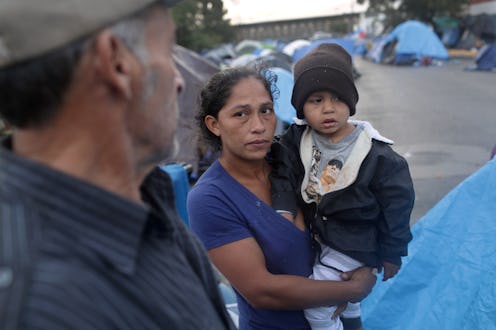News
There’s A Major Update On Border Patrol’s Policy For Detaining Families At The Border

A recent surge in unauthorized crossings at the southern border has caused overcrowding in some detention facilities, U.S. Customs and Border Protection (CBP) told The Wall Street Journal on Tuesday. Because of this congestion, Border Patrol said it will release some migrant families after they're apprehended and processed at the border instead of detaining them.
"CBP is committed to effectively utilizing our resources to support border security operations and ongoing humanitarian efforts," a Border Patrol official said in a statement to Bustle. "To mitigate risks to both officer safety and vulnerable populations under these circumstances, and due to limited bed space, CBP will begin releasing families in the RGV Sector with a Notice to Appear."
The policy change will take place in the Rio Grande Valley region at Texas' southern tip, according to ABC News, where there has recently been a particularly large number of illegal crossings. CBP reported in February that 11,591 people had been apprehended in that area in the fiscal year to date, which constituted a 47 percent increase from last year.
The Trump administration's policy had previously been to detain families who were caught crossing the border without authorization while they waited for court dates, according to The Hill. In contrast, the Obama administration — as well as the Bush administration — had sometimes opted for a "catch and release" policy rather than hold migrants in detention.
President Donald Trump has made his antipathy for that practice clear. "Catch and Release is an obsolete term," he wrote in a November tweet. "It is now Catch and Detain." Federal law prohibits officials from holding children for longer than 20 days, so families have generally been released at that time.
But now CBP will stop holding some migrants in the first place after their initial processing. Instead, agents began releasing hundreds of families a day in the Rio Grande Valley this week, according to The Wall Street Journal. They will be required to appear at court dates, where judges will decide whether they will be deported or be granted asylum. The number of families released each week will depend on how much space is available at holding facilities, The Journal reports.
Homeland Security Secretary Kirstjen Nielsen addressed the recent uptick in illegal border crossings during her 2019 State of Homeland Security address on Monday, calling the situation "a near system-wide meltdown" and a "real-life humanitarian and security catastrophe."
"The system is breaking," Nielsen said, per CNN. "And our communities, our law enforcement personnel, and the migrants themselves are paying the price." She noted that the United States is apprehending people at its highest levels in over 10 years and that officials may process close to 100,000 migrants this month.
The major problem with overcrowded facilities is that they can pose health risks for migrants. At the time of the Trump administration's family separation policy last year, reports indicated that certain detention centers were jam-packed, and some migrants said they didn't have adequate access to food and water. The conditions at CBP facilities have come under particular scrutiny recently after two migrant children died while in Border Patrol custody in December.